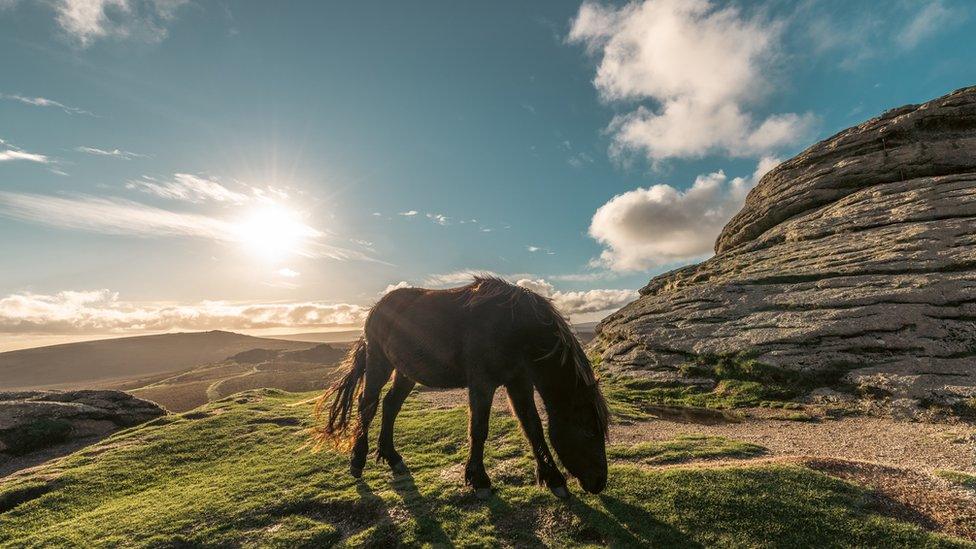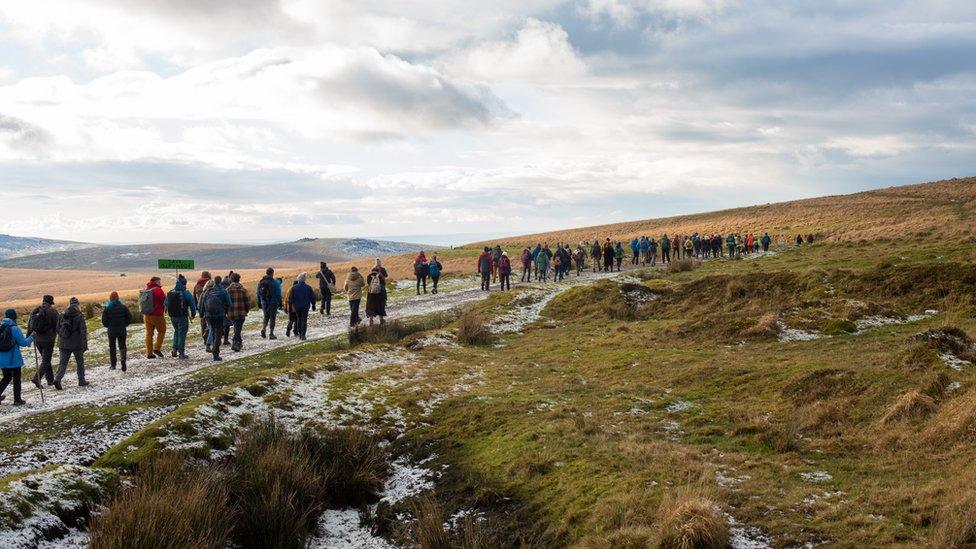Historic wild camping tradition restricted on Dartmoor
- Published
- comments

Dartmoor ponies - that have roamed freely over the land for centuries - are the symbol of the moor.
The owner of an estate on Dartmoor has won the right to remove people "wild" or backpack camping on his land.
The High Court ruling on Friday has been seen as a test case for countryside access.
Dartmoor was the only area of England and Wales where under a local law there had been an assumed right to wild camp without the landowner's permission.
However a High Court judge ruled this was legally wrong and permission was needed.
The case had been brought by Alexander Darwall, a hedge fund manager, and his wife Diana, who have owned the 4,000 acres (16 sq km) on southern Dartmoor since 2013.
At a two-day hearing last December, lawyers for the Darwalls argued that a byelaw in the Dartmoor Commons Act 1985, external which enshrined a historic custom of open access "to all the commons on foot and on horseback for the purposes of open-air recreation", excluded wild camping.
The judge, Sir Julian Flaux, Chancellor of the High Court, agreed. He said the act did not "confer on the public any right to pitch tents or otherwise make camp overnight on Dartmoor Commons. Any such camping requires the consent of the landowner."
If there were such a right, he said it would mean "the landowner would have suffered a loss of control or a usurpation of his rights over his own land."
Mr Justice Flaux also said there was "no local custom of camping which has the force of law" and it was "apparent" that some wild campers on the Darwalls' land did "cause problems in relation to livestock and the environment".

There have been protest hikes on Dartmoor organised by the group 'The Stars are for Everyone'
The Dartmoor National Park Authority had been fighting to maintain full access to the moor, arguing that a tradition of backpack camping on Dartmoor that had existed for decades was included in the definition in section 10 of "open-air recreation."
There is a code of conduct, external that backpackers must follow, carrying their equipment up onto the moor and leaving no trace; no fires or BBQs are allowed, and the maximum stay is two nights.
The Park Authority had argued it was "very different to camping in family-sized tents or in camper vans and motor homes, which on Dartmoor are directed to designated or registered sites".
Dr Kevin Bishop, Chief Executive/National Park Officer for Dartmoor National Park Authority, said: "We are really disappointed with the outcome but obviously respect the judgment."
He said they would now consider their position carefully before deciding on whether to appeal, and on what grounds and in the meantime would amend their website and other information they provide to people who are planning to wild camp on Dartmoor.
"We are keen to work with landowners and other stakeholders to see how we can sustain opportunities for people to wild camp on Dartmoor," he said.
He said they would meet with Dartmoor Common Owners' Association in coming days in a bid to ensure, with the agreement of landowners, the opportunity to wild camp as it existed prior to this judgment.
Wilderness guide Emma Lindford, who leads the campaign group The Stars Are for Everyone, pledged to keep fighting.
"From the outset it was clear that this whole case had nothing to do with the preservation of Dartmoor's delicate ecology," she said. "Instead, this was always one landowner's naked attempt to find any pretext to roll back the public's right to connect with nature on national parkland."
The area of land on Dartmoor covered by the Dartmoor Commons Act 1985 is around 86,000 acres (348 sq km). Wild camping was previously permitted in approximately 71,000 acres (287 sq km).
Now out of bounds to those wishing to stay out overnight unless the Darwalls give their permission is a remote area of land called Stall Moor, covering 2,800 acres (11 sq km).
Doubt has now been thrown on the future of one of England's biggest outdoor adventure events, the Ten Tors Challenge, when thousands of young people hike and camp on the moor.
The Darwalls are the sixth-largest landowners of Dartmoor. The largest landowner is the Duchy of Cornwall, which owns close to 70,000 acres.
The BBC has approached the Darwalls and the Duchy of Cornwall for comment.
Follow Claire on Twitter, external